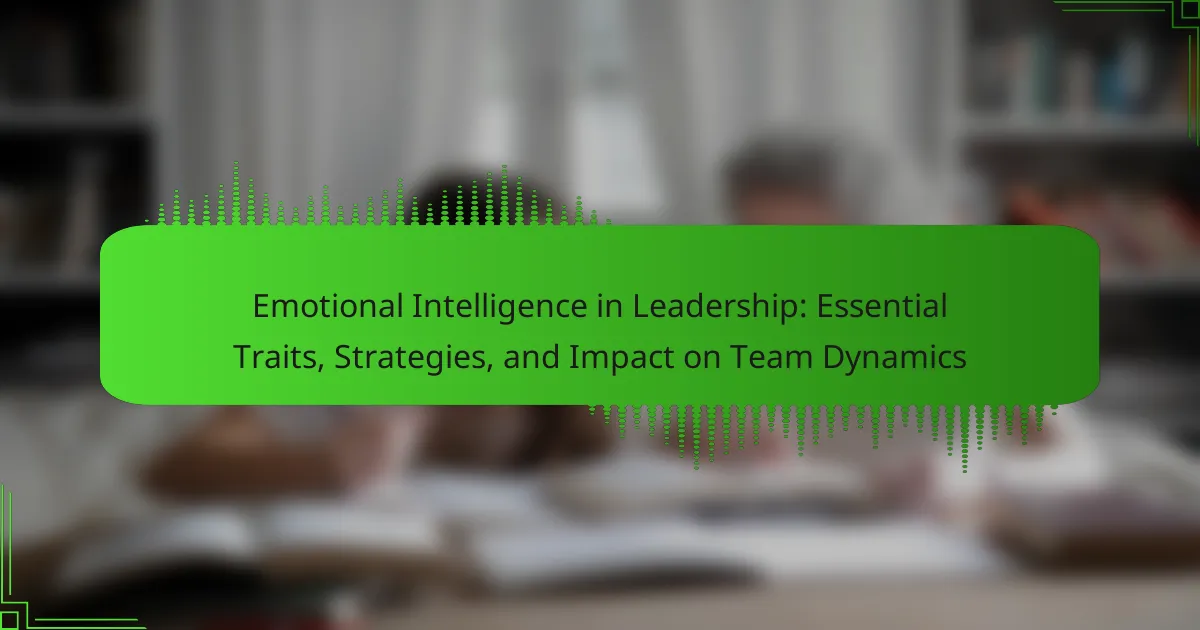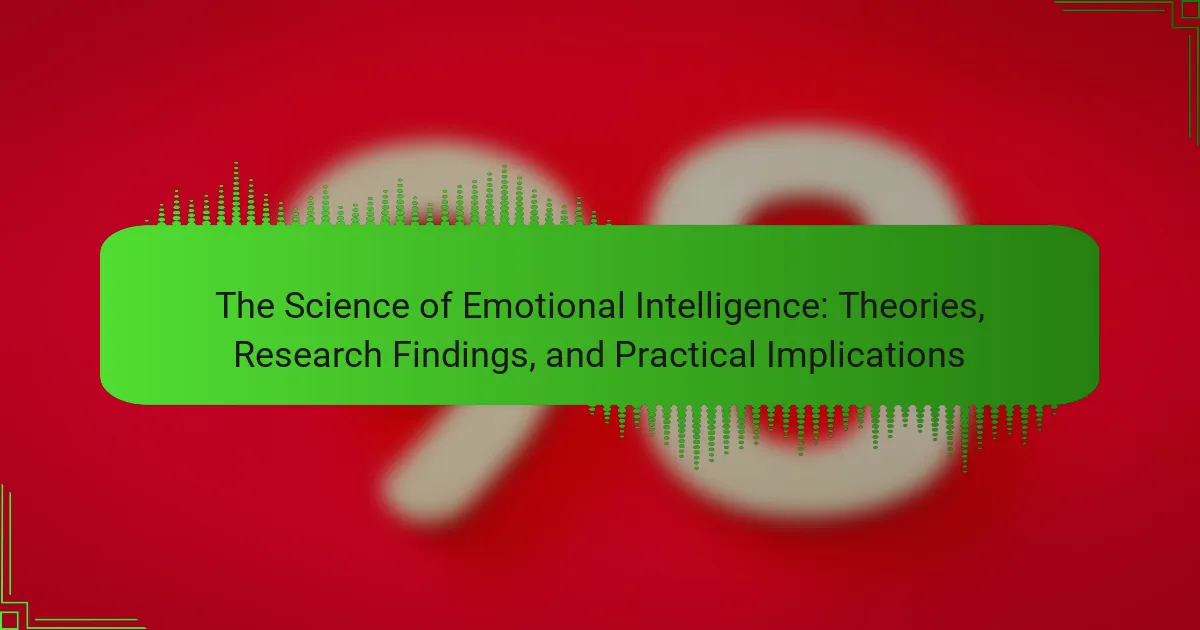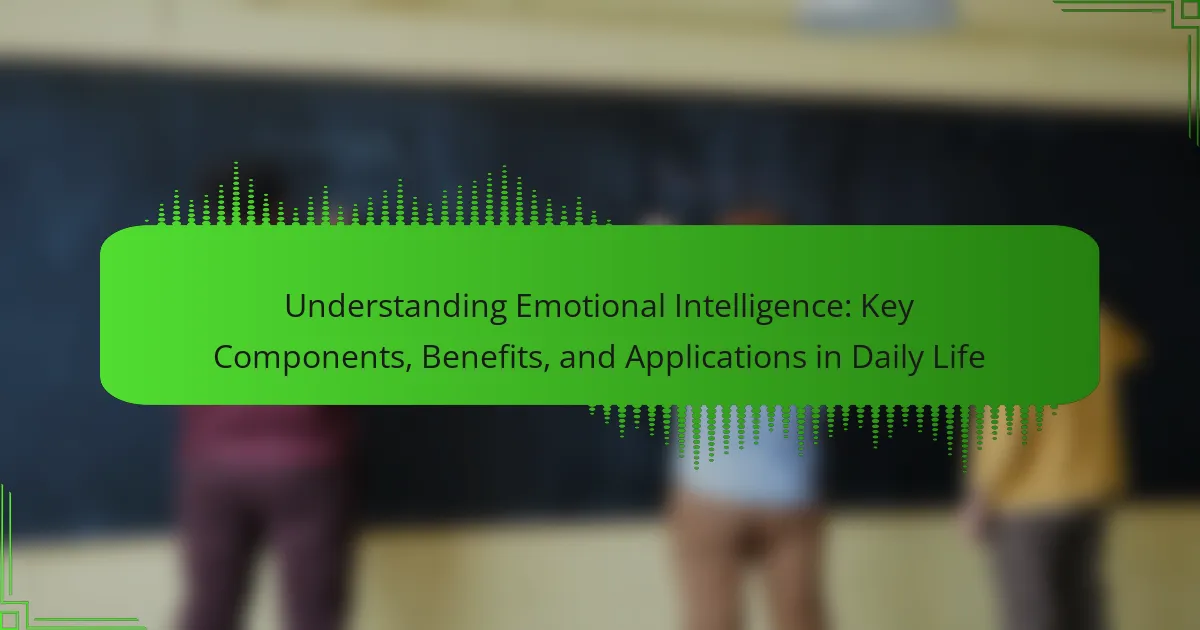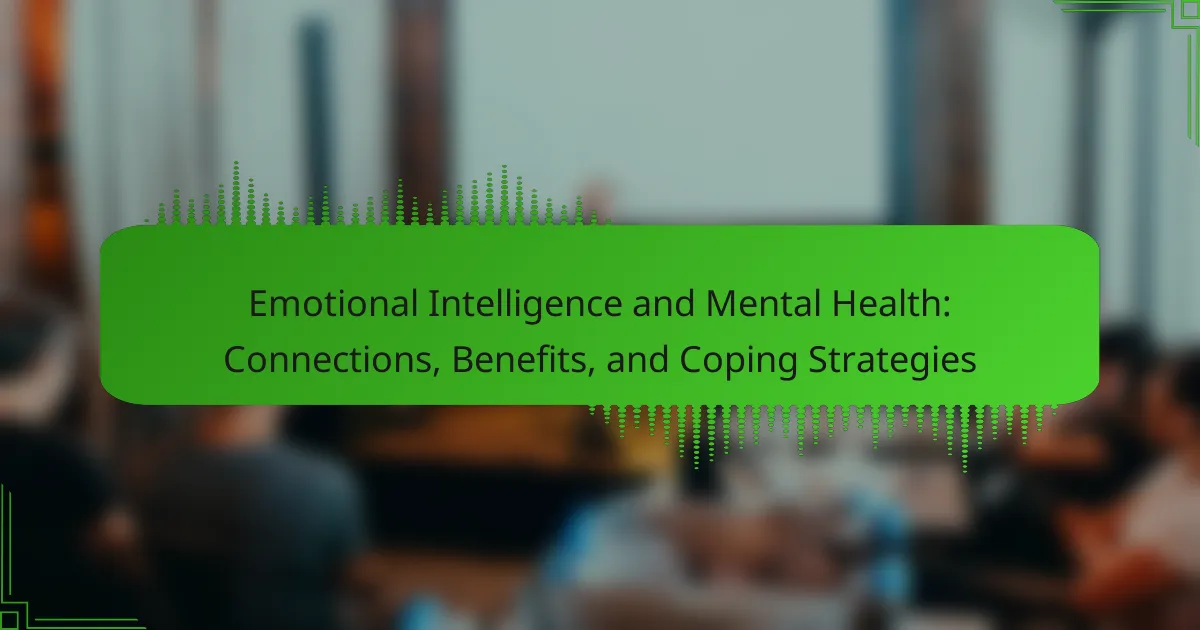Emotional intelligence in leadership is the ability of leaders to recognize, understand, and manage both their own emotions and those of others. This competency is vital for effective leadership, as it enhances communication and strengthens team relationships. Leaders with high emotional intelligence demonstrate traits such as self-awareness, empathy, effective communication, emotional regulation, and social skills, all of which contribute to improved team performance and morale. The article explores strategies leaders can implement to foster emotional intelligence within their teams, including promoting open communication, modeling emotional awareness, providing training, encouraging feedback, creating a supportive environment, and celebrating achievements in emotional intelligence. Research indicates that these practices significantly impact organizational outcomes and team dynamics.
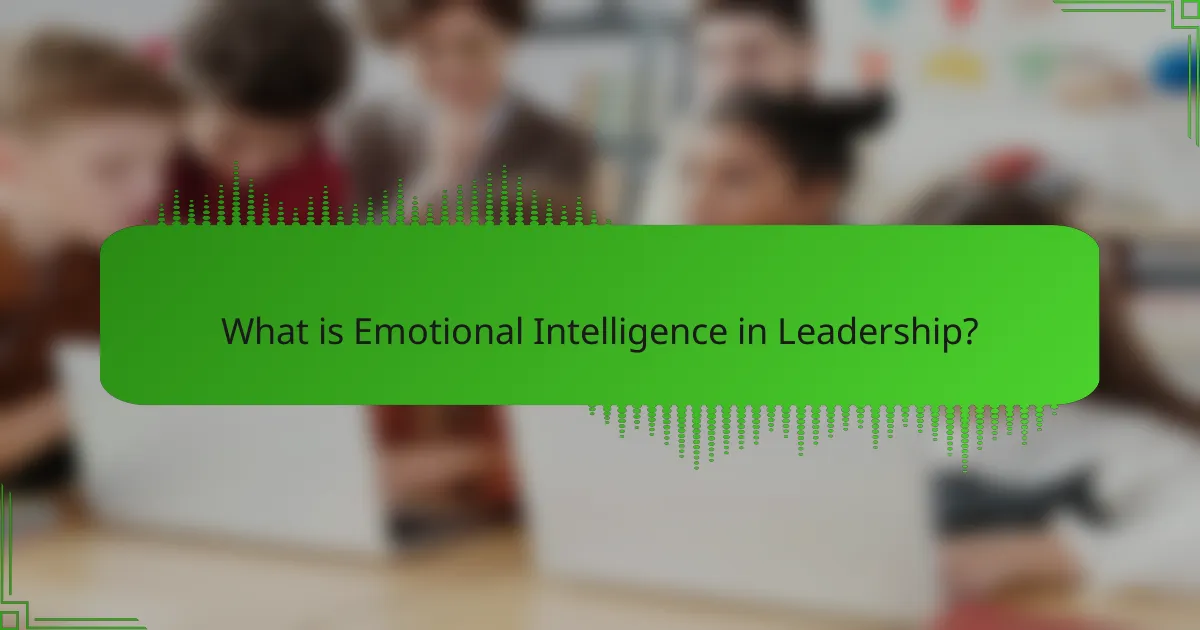
What is Emotional Intelligence in Leadership?
Emotional intelligence in leadership refers to the ability of leaders to recognize, understand, and manage their own emotions and the emotions of others. This skill is crucial for effective leadership as it enhances communication and fosters strong relationships within teams. Leaders with high emotional intelligence can navigate social complexities and make informed decisions that positively impact team dynamics. Research by Goleman (1995) indicates that emotional intelligence accounts for 67% of the skills required for effective leadership. This demonstrates its significance in achieving organizational goals and maintaining a productive work environment.
How does Emotional Intelligence influence leadership effectiveness?
Emotional Intelligence significantly enhances leadership effectiveness. Leaders with high Emotional Intelligence can understand and manage their own emotions. They can also recognize and influence the emotions of others. This skill fosters better communication and collaboration within teams. Research indicates that leaders with strong Emotional Intelligence are more successful in motivating their teams. A study published in the Journal of Organizational Behavior found that Emotional Intelligence correlates with improved job performance. Furthermore, leaders who demonstrate empathy and emotional awareness can build stronger relationships with their team members. This leads to higher employee satisfaction and retention rates.
What are the key components of Emotional Intelligence in leaders?
The key components of Emotional Intelligence in leaders are self-awareness, self-regulation, motivation, empathy, and social skills. Self-awareness allows leaders to recognize their emotions and their impact on others. Self-regulation helps in managing emotions effectively and maintaining control. Motivation drives leaders to pursue goals with energy and persistence. Empathy enables leaders to understand and respond to the emotions of team members. Social skills facilitate effective communication and relationship-building within teams. These components collectively enhance a leader’s ability to connect with their team and foster a positive work environment.
How does Emotional Intelligence differ from traditional intelligence?
Emotional intelligence differs from traditional intelligence in that it focuses on the ability to recognize and manage emotions. Traditional intelligence, often measured by IQ, emphasizes cognitive abilities like reasoning and problem-solving. Emotional intelligence encompasses skills such as empathy, social skills, and emotional regulation. Research indicates that emotional intelligence can significantly impact leadership effectiveness. A study by Goleman (1995) found that emotional intelligence is a key predictor of success in leadership roles. Leaders with high emotional intelligence can foster better team dynamics and enhance collaboration. This demonstrates that emotional intelligence is essential for effective leadership, beyond traditional cognitive skills.
Why is Emotional Intelligence important for leaders?
Emotional Intelligence is crucial for leaders because it enhances their ability to understand and manage emotions. This skill fosters effective communication and builds strong relationships within teams. Leaders with high emotional intelligence can navigate conflicts more effectively. They demonstrate empathy, which increases team morale and trust. Research indicates that emotionally intelligent leaders are more successful in motivating their teams. A study by Goleman shows that emotional intelligence accounts for 67% of the competencies that distinguish outstanding leaders. This underscores its significance in leadership effectiveness and team dynamics.
What impact does Emotional Intelligence have on team performance?
Emotional Intelligence significantly enhances team performance. It improves communication among team members. Teams with high Emotional Intelligence exhibit better collaboration. These teams adapt more effectively to change. Members with strong Emotional Intelligence can resolve conflicts efficiently. Research shows that teams with high Emotional Intelligence are 20% more productive. This productivity stems from improved morale and reduced stress. Teams also demonstrate higher levels of creativity and innovation.
How does Emotional Intelligence contribute to employee engagement?
Emotional Intelligence (EI) significantly contributes to employee engagement by enhancing communication and fostering positive relationships. EI helps leaders understand and manage their emotions and those of their team members. This understanding leads to better conflict resolution and collaboration among employees.
Research indicates that organizations with high EI see increased job satisfaction and commitment. A study by the Center for Creative Leadership found that leaders with high EI have teams that are 20% more engaged. Engaged employees are more productive and less likely to leave the organization.
Furthermore, EI promotes a supportive work environment. Employees feel valued and understood, which boosts morale and motivation. This emotional connection drives employees to invest in their work and align with organizational goals.
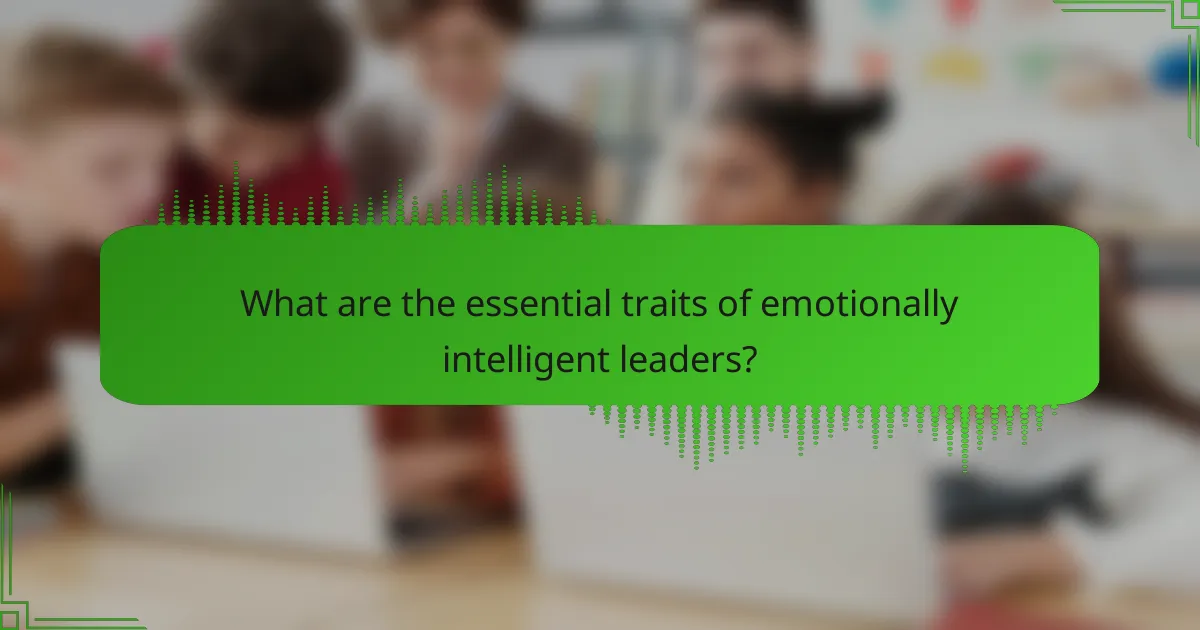
What are the essential traits of emotionally intelligent leaders?
Emotionally intelligent leaders possess several essential traits. They exhibit strong self-awareness, allowing them to understand their emotions and how they affect others. Empathy is another critical trait, enabling leaders to connect with team members’ feelings and perspectives. Effective communication skills are vital, as these leaders can convey messages clearly and listen actively. They demonstrate emotional regulation, managing their responses in various situations. Additionally, they show social skills, fostering positive relationships within their teams. Research indicates that leaders with high emotional intelligence can enhance team performance and morale, leading to better organizational outcomes.
Which specific traits define an emotionally intelligent leader?
Emotionally intelligent leaders possess several specific traits. They exhibit self-awareness, allowing them to understand their emotions and their impact on others. They demonstrate empathy, which enables them to connect with team members on a personal level. These leaders show strong interpersonal skills, facilitating effective communication and collaboration. They are adept at managing their emotions, helping to navigate stressful situations calmly. Emotionally intelligent leaders also possess social skills, which aid in building and maintaining relationships. They exhibit motivation, often driving themselves and their teams toward achieving goals. Lastly, they practice active listening, ensuring team members feel heard and valued. These traits collectively enhance team dynamics and drive organizational success.
How does self-awareness enhance leadership effectiveness?
Self-awareness enhances leadership effectiveness by enabling leaders to understand their strengths and weaknesses. This understanding allows leaders to make informed decisions. Leaders with self-awareness can recognize their emotions and how these affect their behavior. They can adjust their actions based on this insight. This adaptability fosters trust and respect within teams. Research shows that self-aware leaders are more effective in conflict resolution. They are better at communicating and empathizing with team members. Studies indicate that self-awareness is linked to improved team performance and morale.
What role does empathy play in leadership success?
Empathy plays a crucial role in leadership success. It enables leaders to understand and connect with their team members on a deeper level. This connection fosters trust and improves communication within the team. Research indicates that empathetic leaders can enhance employee satisfaction and engagement. According to a study published in the Journal of Applied Psychology, leaders who demonstrate empathy are more effective in motivating their teams. Empathy also helps in conflict resolution, as it allows leaders to see situations from multiple perspectives. By valuing the feelings of others, empathetic leaders create a positive work environment. This ultimately leads to better team performance and organizational success.
How can leaders develop their Emotional Intelligence?
Leaders can develop their Emotional Intelligence by engaging in self-reflection and seeking feedback. Self-reflection allows leaders to assess their emotions and reactions. This practice helps identify areas for improvement. Seeking feedback from peers and team members provides external perspectives on emotional behaviors. Leaders should also practice active listening to enhance empathy. Active listening fosters understanding of others’ emotions and perspectives. Additionally, participating in emotional intelligence training programs can provide structured learning. Research shows that training can significantly improve emotional intelligence skills. Regularly applying these skills in real-world scenarios reinforces learning and growth.
What strategies can leaders use to improve their self-regulation?
Leaders can improve their self-regulation through mindfulness practices, emotional awareness, and setting clear goals. Mindfulness practices help leaders stay present and manage stress effectively. Emotional awareness allows leaders to recognize their feelings and triggers. Setting clear goals provides a framework for accountability and focus. Additionally, seeking feedback from peers can enhance self-awareness. Regular reflection on decisions and behaviors fosters growth. Engaging in stress-reduction techniques, such as exercise, can also improve self-regulation. These strategies contribute to better emotional control and decision-making in leadership roles.
How can leaders cultivate better social skills?
Leaders can cultivate better social skills through active listening and empathy. Active listening involves fully concentrating on the speaker, understanding their message, and responding thoughtfully. This practice enhances communication and builds trust within teams. Empathy allows leaders to understand and share the feelings of others. It fosters stronger relationships and encourages collaboration.
Moreover, engaging in social interactions regularly helps leaders practice and refine their skills. Participating in team activities or networking events provides opportunities to connect with diverse individuals. Feedback from peers can also guide leaders in improving their social interactions. Studies show that leaders with high emotional intelligence positively impact team dynamics and performance.
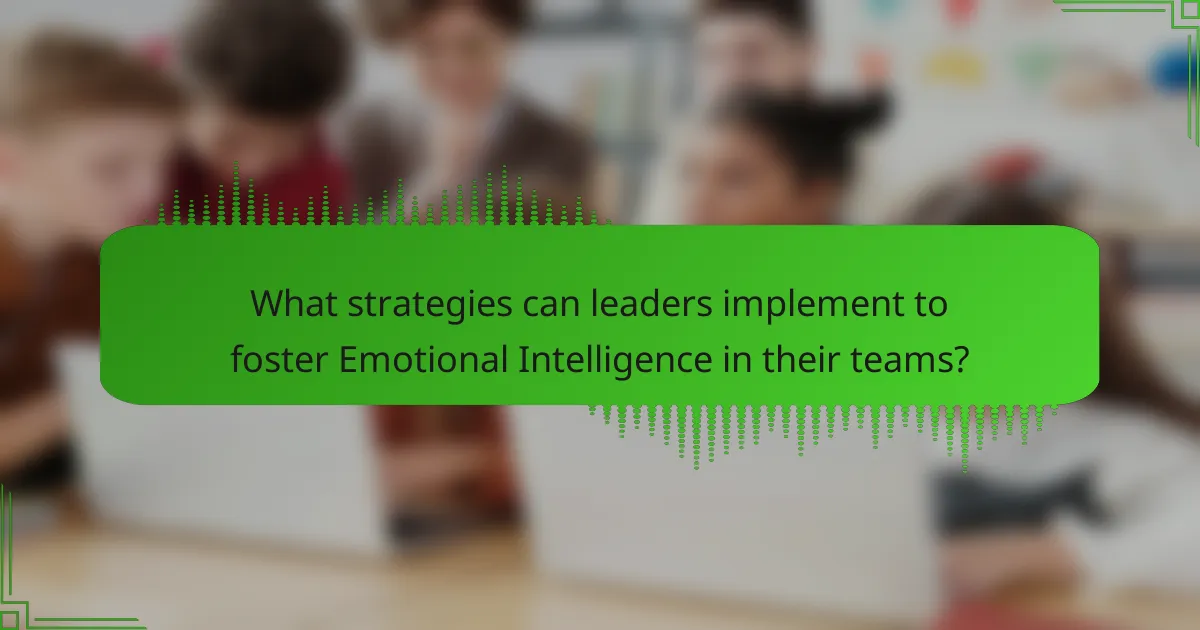
What strategies can leaders implement to foster Emotional Intelligence in their teams?
Leaders can implement several strategies to foster Emotional Intelligence in their teams. First, they can promote open communication. This encourages team members to express their feelings and thoughts. Second, leaders should model emotional awareness. By demonstrating their own emotional intelligence, leaders set a standard for the team. Third, providing training on emotional intelligence skills can enhance team capabilities. Research shows that training programs can improve emotional awareness and empathy.
Additionally, leaders can encourage feedback among team members. Constructive feedback helps individuals understand their emotional impact on others. Creating a supportive environment is also crucial. A safe space allows team members to share vulnerabilities without fear of judgment. Lastly, recognizing and celebrating emotional intelligence achievements fosters a culture of awareness. This reinforces the importance of emotional intelligence within the team.
How can leaders create an emotionally intelligent workplace culture?
Leaders can create an emotionally intelligent workplace culture by fostering open communication and empathy. They should encourage team members to express their feelings and thoughts freely. This can be achieved through regular check-ins and feedback sessions. Leaders must also model emotional awareness themselves. Demonstrating vulnerability can promote trust among employees. Training programs on emotional intelligence can enhance team skills. Research shows that companies with high emotional intelligence have better employee satisfaction. This leads to increased productivity and lower turnover rates.
What training programs are effective for enhancing team Emotional Intelligence?
Programs that enhance team Emotional Intelligence include experiential learning, coaching, and workshops. Experiential learning focuses on real-life scenarios that promote empathy and self-awareness. Coaching provides personalized feedback to improve emotional skills. Workshops often cover topics like conflict resolution and communication techniques. Research indicates that these methods lead to measurable improvements in team dynamics. A study by Goleman et al. (2013) found that teams with higher Emotional Intelligence perform better. These training programs foster a culture of collaboration and understanding within teams.
How can leaders model Emotional Intelligence behaviors for their teams?
Leaders can model Emotional Intelligence behaviors for their teams by demonstrating self-awareness and empathy. They should openly acknowledge their emotions and how these affect their decisions. This transparency fosters a safe environment for team members to express their feelings. Leaders can also practice active listening by fully engaging with team members during conversations. This builds trust and shows that their input is valued. Additionally, leaders can manage their reactions in stressful situations, demonstrating emotional regulation. By responding calmly, they set a standard for the team. Furthermore, providing constructive feedback helps team members develop their own Emotional Intelligence skills. Research indicates that teams led by emotionally intelligent leaders exhibit higher engagement and performance.
What challenges do leaders face in developing Emotional Intelligence?
Leaders face several challenges in developing Emotional Intelligence (EI). One significant challenge is self-awareness. Many leaders struggle to recognize their own emotions and how these affect their behavior. This lack of awareness can hinder their ability to empathize with others. Another challenge is managing stress. High-pressure environments can lead to emotional responses that are not conducive to effective leadership. Additionally, leaders may find it difficult to communicate effectively. Miscommunication can arise from emotional misunderstandings, leading to conflict.
Furthermore, leaders often encounter resistance to change. Developing EI requires a shift in mindset, which can be met with skepticism from team members. Another challenge is the lack of training resources. Many organizations do not provide adequate training on EI, limiting leaders’ opportunities for growth. Lastly, time constraints can impede the development of EI. Leaders often prioritize immediate tasks over personal development, which can stall their progress in emotional competencies.
How can leaders overcome resistance to change in team dynamics?
Leaders can overcome resistance to change in team dynamics by fostering open communication. This involves actively listening to team members’ concerns and addressing them transparently. Providing a clear vision of the change helps team members understand its purpose. Engaging team members in the change process promotes a sense of ownership. Training and support can ease the transition, making it less intimidating. Recognizing and rewarding adaptability encourages a positive attitude towards change. Research shows that teams with high emotional intelligence can navigate change more effectively. Leaders who demonstrate empathy and understanding are more likely to gain team buy-in.
What common pitfalls should leaders avoid when promoting Emotional Intelligence?
Leaders should avoid underestimating the complexity of Emotional Intelligence (EI). Simplifying EI to just empathy can lead to inadequate training. Leaders must also refrain from neglecting personal development. Failing to improve their own EI can hinder their ability to guide others. Additionally, leaders should avoid a one-size-fits-all approach. Different team members may require tailored strategies for EI development. Another pitfall is not measuring the impact of EI initiatives. Without evaluation, leaders cannot determine the effectiveness of their efforts. Lastly, leaders should steer clear of promoting EI without a supportive culture. A lack of organizational support can undermine EI training efforts.
What is the overall impact of Emotional Intelligence on team dynamics?
Emotional Intelligence significantly enhances team dynamics. It fosters better communication among team members. Teams with high Emotional Intelligence experience increased collaboration. Members are more empathetic and understanding towards each other. This leads to improved conflict resolution. Research indicates that teams with high Emotional Intelligence perform better overall. A study by Dr. Vanessa Druskat and Dr. Steven Wolff found that emotionally intelligent teams are more effective. They reported higher levels of trust and morale. These factors contribute to a positive work environment and improved outcomes.
How does Emotional Intelligence improve communication within teams?
Emotional Intelligence enhances communication within teams by fostering understanding and empathy among members. It allows individuals to recognize their own emotions and those of others. This recognition leads to better conflict resolution and collaborative problem-solving. Teams with high Emotional Intelligence experience improved trust and rapport. Research shows that teams with strong Emotional Intelligence can outperform others by 20% in productivity. Effective communication reduces misunderstandings and increases engagement. Consequently, Emotional Intelligence serves as a vital tool for effective teamwork and collaboration.
What effect does Emotional Intelligence have on conflict resolution?
Emotional Intelligence significantly enhances conflict resolution. It enables individuals to understand and manage their emotions and the emotions of others. This understanding fosters effective communication during conflicts. High Emotional Intelligence allows leaders to empathize with team members. Empathy helps identify underlying issues causing the conflict. Additionally, it promotes collaboration and problem-solving. Research shows that teams with emotionally intelligent leaders resolve conflicts more efficiently. A study by Goleman (1998) indicates that Emotional Intelligence is crucial for successful conflict management.
What practical tips can leaders use to enhance their Emotional Intelligence?
Leaders can enhance their Emotional Intelligence by practicing self-awareness. This involves recognizing their emotions and understanding how they affect their behavior. Regular reflection on personal experiences can improve this skill.
Another practical tip is to develop empathy. Leaders should actively listen to their team members. This can foster stronger relationships and better communication.
Additionally, leaders can manage their emotions effectively. Techniques such as mindfulness or stress management can aid in this process.
Providing constructive feedback is also crucial. Leaders should focus on being specific and supportive. This encourages a positive atmosphere for growth.
Finally, seeking feedback on their leadership style can be beneficial. This allows leaders to identify areas for improvement in their Emotional Intelligence.
Emotional intelligence in leadership refers to the ability of leaders to recognize, understand, and manage their own emotions and the emotions of others, which is crucial for effective communication and strong team relationships. This article explores the significance of emotional intelligence, detailing its impact on leadership effectiveness, key components such as self-awareness and empathy, and the differences between emotional and traditional intelligence. Additionally, it discusses strategies for leaders to develop emotional intelligence, foster it within their teams, and create a supportive workplace culture, highlighting its overall benefits on team dynamics and performance.
